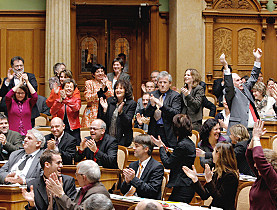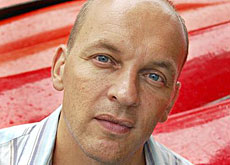Swiss politics looks back on eventful year

Switzerland's usually calm political atmosphere was thrown into turbulence in 2007, leaving many to wonder whether things would ever be the same again.
It was a year of ups and downs for the rightwing People’s Party, the largest in parliament. In the October elections it increased its share of the vote yet further, to 29 per cent.
But in a major surprise less than two months later, its controversial figurehead, Christoph Blocher, was voted out of the cabinet.
The elections brought gloom for the centre left Socialist Party, whose share of the vote fell below 20 per cent, although it remained the second largest party. Many supporters of the left switched from the Socialists to the Greens, who achieved almost ten per cent.
Clever campaign
The run-up to the elections was unusually aggressive by Swiss standards, and again it was the People’s Party which dominated the field. Using the most up-to-date methods of communication, and unworried by political correctness, it set the tone for the whole campaign.
The most controversial element was its “black sheep” poster, which showed three white sheep kicking a black sheep out of Switzerland. The poster, considered by many to be “anti-foreigner”, was widely criticised in Switzerland, and attracted much negative comment abroad. But it proved popular with party supporters.
The party campaign also focussed on Blocher himself. In Switzerland, where personalities traditionally keep in the background, this was highly unusual. But the slogan “Strengthen Blocher, vote for the People’s Party” won voters in places where the party was not especially active.
Growing disquiet
Once the People’s Party had established its strong position of parliament in the elections, it appeared to be a foregone conclusion that Blocher would be re-elected for a second ministerial term.
People’s Party officials were not alone in failing to notice how the disquiet of the centre parties was strengthening an anti-Blocher movement. However, even in the second round of the parliamentary elections, for seats where no candidate had gained enough votes to be elected outright, it was clear that even on the centre-right not everyone was happy about the prospect of People’s Party calling the tune.
A major upset
In the run-up to the cabinet election, Socialists, Greens and centre-right Christian Democrats formed a behind-the-scenes alliance designed to unseat Blocher. They backed a second, less controversial, member of the People’s Party, Eveline Widmer-Schlumpf, to stand against him.
The announcement that she had succeeded in gaining more votes than her eminent rival unleashed wild jubilation in parliament on the one hand, and consternation and indignation on the other. Widmer-Schlumpf asked for time to consider her position.
The Swiss waited with bated breath – not something they are used to in politics – to hear her decision the next morning.
When she announced that she would accept her election, her party was plunged into turmoil. It declared that it would not support her, or the other People’s Party minister, Samuel Schmid, who is also regarded as a moderate.
The People’s Party said instead that it would go into opposition. Under the Swiss system of direct democracy, this means that it will put its policies directly to the people by launching people’s initiatives about the issues it considers important.
Its highly competent, if controversial, election campaign indicates that it is at present much better able to get its message across than any of the other parties.
Meanwhile, parliament has come out of the latest events strengthened, having proved that it does not merely rubber-stamp decisions taken elsewhere.
But only time will tell what the long-term impact of this small revolution in Swiss politics will be.
swissinfo, adapted from an article in Italian by Andrea Tognina

More
Direct democracy
In Switzerland’s unique system of government, the seven ministers are elected by the members of parliament.
The seats are divided among the four parties with the largest representation in parliament.
It is very rare for any minister to lose his or her seat if they decide to present themselves for re-election.

In compliance with the JTI standards
More: SWI swissinfo.ch certified by the Journalism Trust Initiative


You can find an overview of ongoing debates with our journalists here . Please join us!
If you want to start a conversation about a topic raised in this article or want to report factual errors, email us at english@swissinfo.ch.